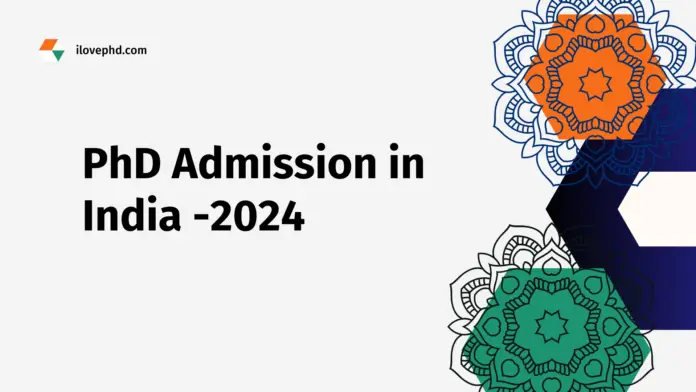Pursuing a PhD in India is a significant academic pursuit that opens doors to advanced research and academic careers. If you are considering Ph.D. admission in 2023, this comprehensive guide will provide you with valuable information about the institutions offering PhD programs in government universities in India. ilovephd will explore the eligibility criteria, fees, and publication requirements to help you make an informed decision about your Ph.D. journey.
Top 50 research institutions in India in 2023 to do PhD
The top 50 research institutions in India in 2023, according to the National Institutional Ranking Framework (NIRF):
- Indian Institute of Science (IISc)
- Indian Institute of Technology Madras (IIT Madras)
- Indian Institute of Technology, Delhi (IIT Delhi)
- Indian Institute of Technology, Bombay (IIT Bombay)
- Indian Institute of Technology Kharagpur (IIT Kharagpur)
- Indian Institute of Technology Kanpur (IIT Kanpur)
- Tata Institute of Fundamental Research (TIFR)
- Indian Institute of Technology Roorkee (IIT Roorkee)
- Indian Institute of Technology Guwahati (IIT Guwahati)
- Indian Institute of Technology Hyderabad (IIT Hyderabad)
- Indian Institute of Technology Indore (IIT Indore)
- Indian Institute of Technology Bhubaneswar (IIT Bhubaneswar)
- Indian Institute of Technology Patna (IIT Patna)
- Indian Institute of Technology Ropar (IIT Ropar)
- Indian Institute of Technology Tirupati (IIT Tirupati)
- Indian Institute of Technology Gandhinagar (IIT Gandhinagar)
- Indian Institute of Technology Mandi (IIT Mandi)
- Indian Institute of Technology Jammu (IIT Jammu)
- Indian Institute of Technology Bhilai (IIT Bhilai)
- Indian Institute of Technology Palakkad (IIT Palakkad)
- Indian Institute of Technology Dharwad (IIT Dharwad)
- Indian Institute of Technology Assam (IIT Assam)
- Indian Institute of Technology Bhubaneswar (IIT Bhubaneswar)
- Indian Institute of Technology Jammu (IIT Jammu)
- Indian Institute of Technology Bhilai (IIT Bhilai)
- Birla Institute of Technology and Science Pilani (BITS Pilani)
- Indian Institute of Information Technology, Allahabad (IIIT Allahabad)
- Indian Institute of Information Technology, Bangalore (IIIT Bangalore)
- Indian Institute of Information Technology, Guwahati (IIIT Guwahati)
- Indian Institute of Information Technology, Hyderabad (IIIT Hyderabad)
- Indian Institute of Information Technology, Kerala (IIIT Kerala)
- Indian Institute of Information Technology, Lucknow (IIIT Lucknow)
- Indian Institute of Information Technology, Manipur (IIIT Manipur)
- Indian Institute of Information Technology, Patna (IIIT Patna)
- Indian Institute of Information Technology, Sricity (IIIT Sricity)
- Indian Institute of Information Technology, Vadodara (IIIT Vadodara)
- National Institute of Technology Calicut (NIT Calicut)
- National Institute of Technology Durgapur (NIT Durgapur)
- National Institute of Technology Hamirpur (NIT Hamirpur)
- National Institute of Technology Jalandhar (NIT Jalandhar)
- National Institute of Technology Kurukshetra (NIT Kurukshetra)
- National Institute of Technology Manipur (NIT Manipur)
- National Institute of Technology Raipur (NIT Raipur)
- National Institute of Technology Silchar (NIT Silchar)
- National Institute of Technology Tiruchirappalli (NIT Tiruchirappalli)
- National Institute of Technology Warangal (NIT Warangal)
- National Institute of Technology, Delhi (NIT Delhi)
- National Institute of Technology, Durgapur (NIT Durgapur)
- National Institute of Technology, Jamshedpur (NIT Jamshedpur)
- National Institute of Technology, Rourkela (NIT Rourkela)
- These institutions are all highly respected for their research output and their contributions to the advancement of knowledge. They offer a wide range of research programs and opportunities for students and faculty, and they are committed to excellence in research.
Eligibility Criteria to Get PhD admission in government universities in India
To be eligible for PhD admission in government universities in India, applicants generally need to meet the following criteria:
- Educational Qualification: A postgraduate degree (Master’s or equivalent) in a relevant discipline from a recognized university or institute.
- Minimum Marks: Most institutions require a minimum aggregate percentage of 55% or an equivalent CGPA in the qualifying examination.
- Entrance Exams: Universities may conduct their entrance exams, while some accept national-level exams such as UGC-NET, CSIR-NET, GATE, or JRF.
- Research Proposal: A well-defined research proposal showcasing your research interests, objectives, and methodology is often required.
- Interviews: Shortlisted candidates are usually called for an interview or written test to assess their research aptitude and subject knowledge.
Fees for PhD admission 2024 in govt universities in India
The fee structure for Ph.D. programs in government universities in India can vary based on the institution and discipline. However, government universities generally offer PhD programs with nominal or subsidized fees compared to private universities. It is advisable to visit the official websites of the respective universities for accurate and up-to-date fee details.
Publication Requirements for PhD in India
PhD programs emphasize the importance of research output and scholarly publications. While publication requirements may vary across universities and disciplines, it is common for Ph.D. scholars to publish their research in reputed academic journals or conference proceedings during their program.
The number of publications and specific requirements may differ from one institution to another. It is essential to consult the respective university’s guidelines and the recommendations of your supervisor regarding publication expectations.
Conclusion:
Embarking on a PhD journey in a government university in India in 2024 is an exciting opportunity to contribute to the academic and research landscape.
By considering the list of institutions, eligibility criteria, fees, and publication requirements discussed in this guide, you can navigate the PhD admission process more effectively. Remember to visit the official websites of the universities you are interested in for the most accurate and updated information. Good luck with your Ph.D. admission and future research endeavors!

